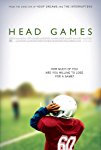Eye For Film >> Movies >> Head Games (2012) Film Review
Head Games
Reviewed by: Jennie Kermode

Have you ever experienced concussion? Most people do at some point in life. It might not seem like a big deal. You bang your head and feel dizzy, perhaps black out just for a second or two. Colours might seem wrong for a moment or you might find yourself seeing double. you might 'see stars'. The chances are you'll shrug it off and get on with whatever you were doing. But each time you suffer concussion, you've actually damaged your brain. If that damage doesn't get time to heal, it can lead to long term problems. In some sports, participants can suffer concussion several times in the same day.
Chris Nowinski played American football at university and went on to enjoy a short career as a professional wrestler. This ended after successive blows to the head left him with chronic headaches. Retiring from contact sports, he decided to put his Harvard education to good use and start researching the phenomenon of head injuries in sport. In 2006 he published the book Head Games, revealing a hidden crisis of startling proportions.

This documentary, led by Nowinski himself, is simultaneously an exploration of the phenomenon (known in medicine as chronic traumatic encephalopathy) and an attempt to bring it to the attention of a wider audience. His work has already led to rule changes in some professional sports but he's also worried about the many people who play at an amateur level - especially children, whose brains are more vulnerable. There's widespread ignorance about the dangers of concussion and some players commenting here say they prefer not to think about it. Meanwhile, athletes are dying in their forties, and sometimes even younger, from a dementia-like disease caused by a build-up of particular proteins in damaged parts of the brain.
Few contemporary documentaries pack as much information into as short a time as this. The pacing leaves something to be desired and viewers unused to academic subjects may struggle a bit, finding that there's too much to take in at times and that it's slow at others. Overall, though, it does a good job of putting the important facts in simple terms, and animation is used effectively to illustrate the immediate effects of concussion. It also provides enough in-depth information to satisfy those with an existing interest in neurology and to provide a good starting point for those who want to investigate further.
Punctuating the film's drier stretches are a number of genuinely shocking moments. Several tragic personal stories are recounted but it's the scale of the problem that makes the biggest impact. Of course, there are a lot of vested interests in keeping sport just the way it is, and there's also cultural resistance to change. Most sports have adapted over the years to reduce obvious risks. The problem is that this one, because it usually manifests years after the act, is all too easily hidden.
Head Games will make you think again about how you participate in sport. Of course, some sports are safer than others and it's a shame that this isn't looked at in more depth, especially as some plyers seem to see it as a choice between doing what they love or doing nothing at all. It takes an inner city kids' coach to point out that playng competitive sport may still be a lot safer than burning off that energy and aggression by getting into trouble on the streets. But this is still an important wake-up call that sports players should heed, lest their eyes stay shut permanently.
Reviewed on: 03 Oct 2012
















